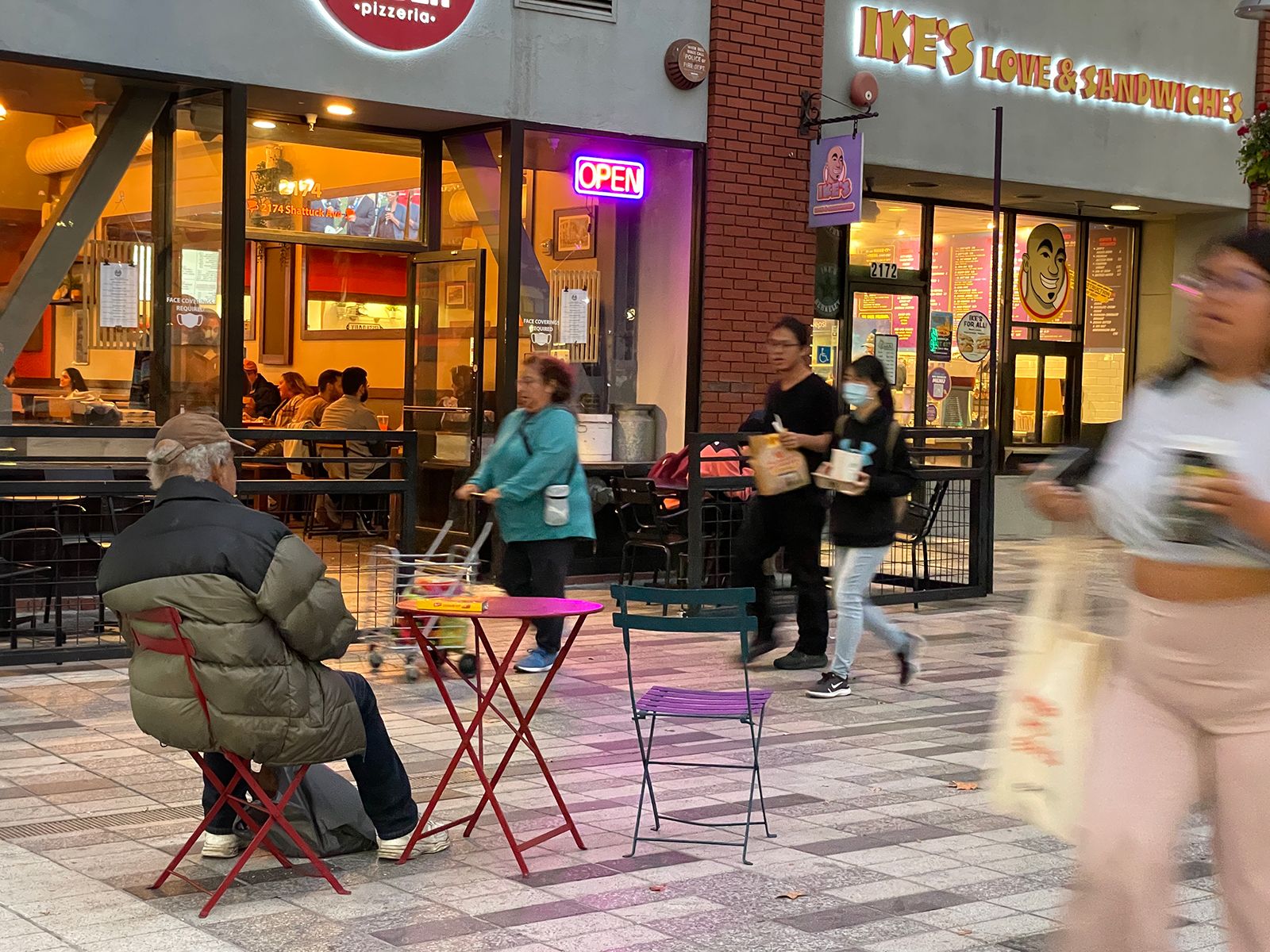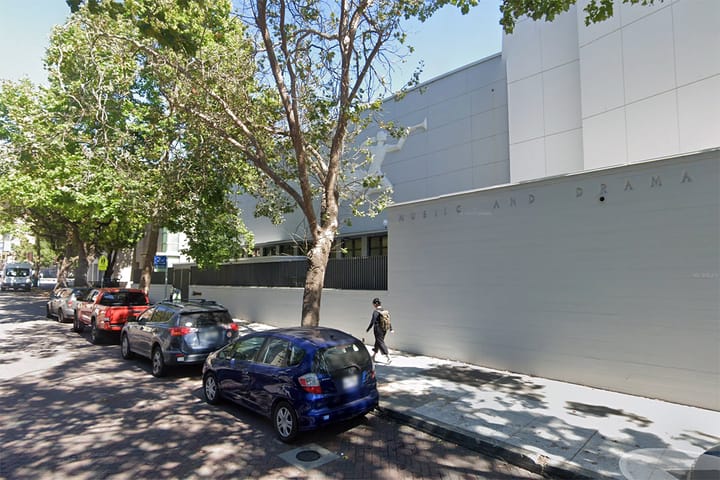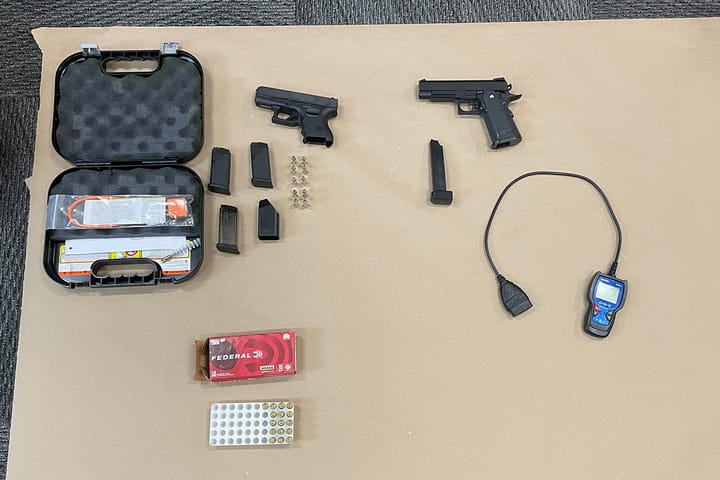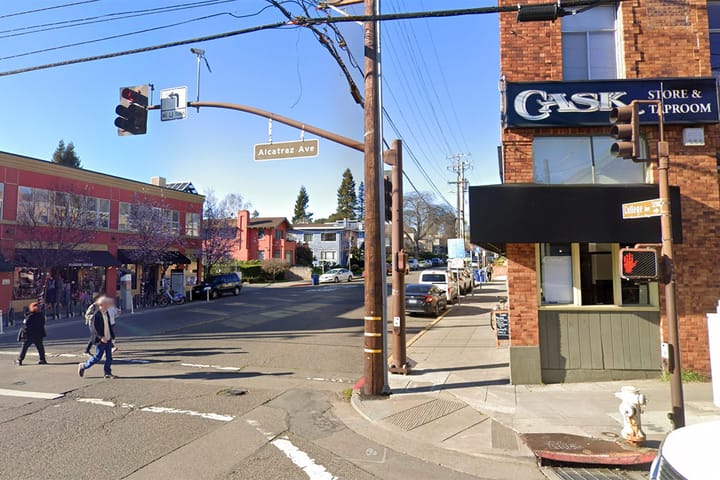Too much crime, too little action: Berkeley merchants raise alarm
"We have an email chain that includes two years of merchants reporting crime to the mayor and City Council," said Eduardo Perez of Sliver. "No one does anything."

Merchants in Berkeley say they feel "under assault" after recent incidents of violent crime that are only the latest in a disturbing pattern they say has been going on for years.
Merchants told The Berkeley Scanner this week that they wish the city would do more to prioritize worker safety, and that pleas for help from city officials have too often been met with silence.
On Monday, a man punched a worker at Annapurna in the head as he held newspapers on Telegraph Avenue in the Southside neighborhood near UC Berkeley.
On Wednesday, a man went into Sliver, also on Telegraph Avenue, and tried to take money out of the cash register.
According to the store owner, customers fled the shop and staff locked themselves in the kitchen in terror when the man became aggressive. Despite the lock, the man was able to kick in the door and get inside.
When he started charging employees, one of them grabbed a knife to protect his coworkers and ward off the intruder.
"They didn't have anywhere to run. They kind of had to stand their ground," said Eduardo Perez, co-owner of longtime Berkeley family business Sliver Pizzeria. "We deal with violence all the time."
The man eventually left the business and was arrested a short time later.
Perez and other members of the local business community have been pushing the city since 2019 on the subject of worker safety. That's when several business owners came up with the idea to form Berkeley Merchants United, a coalition they hoped would help them communicate their message to City Hall — and get relief.
In the latter part of that year, they held a summit with city staff and officials where merchants outlined a series of disturbing incidents that had happened to workers, many of whom are women, immigrants and people of color.
In one of those incidents, a mentally unstable woman who was well known to first responders went into a crowded downtown bar and tried to steal a beer from a customer. When the general manager got her outside, she bashed his head into the door frame, leaving him with a concussion. Then she went back inside the business where she began pulling stitches out of a recent wound and "flinging blood" around the bar.
When the merchants described their problems in 2019, the city responded, putting a proactive police unit to work downtown. The Downtown Task Force, as it was then called, focused on problematic street behavior and quality-of-life crimes. By many accounts, conditions improved for a time.
Two years of reporting, with limited results
But then, as the COVID-19 pandemic wore on, Berkeley merchants said the situation seemed to return to the "anything goes" environment that had initially raised their alarm to a fever pitch.
"We've dealt with people with swords in their jackets, smoking meth, urinating in the restaurant. Coming into restaurants and taking food away from our customers. It's insane," Perez said. "We get spat on all the time."
Many of the problems have involved people on drugs or with mental health issues, or some combination of the two, merchants said.
Perez recalled a time when a female employee was chased for blocks by a man who said he was going to rape and burn her. Workers are also routinely targeted with racial epithets, Perez said.
"We have an email chain that includes two years of merchants reporting crime to the mayor and City Council," he added. "There’s attorneys on there. And no one does anything."
Then there was the time he and his daughter, who was then 14, stopped by the Telegraph Avenue Sliver to use the restroom. Outside, a man was defecating on the sidewalk.
"We see this stuff every day," Perez said. "Everyone kind of just steps over the problem. There's a million of these examples."
"Merchants are scared"
One incident that has continued to haunt downtown merchants happened in 2017 when a man with a knife raped a young woman in the storage room of a popular BART Plaza eatery.
The woman had been working alone and was closing up for the night when a stranger knocked on the door and pushed his way inside. The attack was recorded on the shop's surveillance cameras.
The assailant, who was on probation at the time of the rape, was convicted and sentenced to 25 years to life at San Quentin, according to court records.
Years have gone by, but people who knew about what happened say they won't ever forget it.
Another popular Berkeley food business closed after an intruder jumped over the counter and pistol-whipped its owner. In the hospital, the owner had said she could not bear for something like that to happen to one of her employees, Perez recalled.
"Merchants are scared," he said. "A lot of us don’t live in Berkeley so we don't have a vote. We feel like we have no value within the city."
The business owners, many of whom are people of color and immigrants, feel helpless and don't always report the crimes. Some have said they are afraid to speak out publicly, fearing blowback from some segments of the community.
"We are left alone," said Simone Arpaio, co-owner of Almare Gelato Italiano in BART Plaza. "There is nobody that you can rely on."
Arpaio was part of the 2019 round table with city staff and officials. He too is part of the years-long email string.
How does public safety fit into the city's goals?
He recalled telling the city: "It looks like there’s this huge problem in Berkeley," adding: "Isn’t safety your main priority?"
Arpaio said the only answer was silence.
"I'm baffled by how much they never reply," he told The Berkeley Scanner. "The Berkeley Police Department is a force that is regarded as the enemy — when the enemy is the criminals. It's amazing that people don’t get in the streets and protest about this."
He recalled how a friend who owns a restaurant downtown once got into a fight with a homeless person after the man, who was drunk, threw a wine bottle at him.
And he said he had been surprised when there was no public outcry from officials when a woman reportedly tried to abduct several children in central Berkeley in recent months. Or when, earlier this year, a man sexually assaulted a woman on Colusa Avenue at knifepoint.
Police later said they linked the man to a sex crime series with at least five victims, two of whom were children on their way to school in Albany.
"It looks like, in Berkeley, it’s not a good political topic to care about safety," Arpaio said. "And I think that the problem is way deeper than the politicians. Why aren’t people in Berkeley outraged by the crimes that happen?"
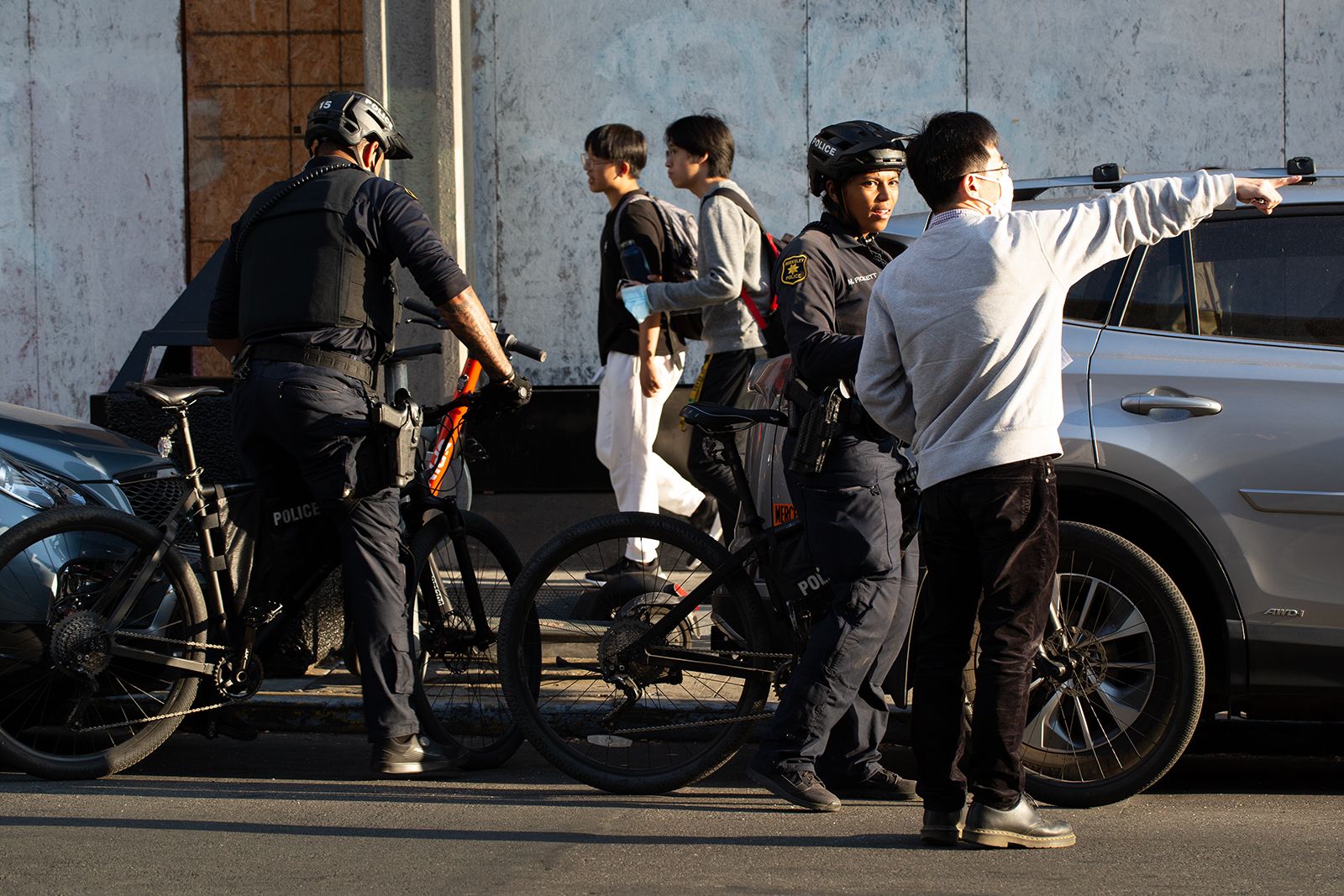
Part of the challenge, merchants said, is the high number of repeat offenders who cause many of the problems. When they are arrested, they generally aren't in custody for long.
And, if convicted, misdemeanor probation may be the only outcome.
As many have said, the justice system in Alameda County has come to feel like a revolving door, especially when it comes to quality-of-life crimes.
Merchants have said BPD's Bike Force, a proactive team that grew out of the Downtown Task Force, has been a big help.
But they said they believe more officers on the streets, and a bigger bike unit, would also make a difference: Potential offenders who see a police officer nearby are less likely to act out, they said.
"What we’ve been stressing is the need to start enforcing all of the sidewalk ordinances again," said John Caner, CEO of the Downtown Berkeley Association (DBA), which represents the neighborhood's merchants.
"The challenge, of course, is that BPD is even further stretched," he said, a reference to the department's ongoing staffing crisis. "There is a limited amount of resources. And a lot of these violations are misdemeanors."
Berkeley needs a "tough love" approach, some say
Some parts of California are launching CARE Court programs that would mandate treatment for those suffering from severe mental illness and substance abuse.
Caner said programs like this will make a difference, but it may be at least two years before it happens in Alameda County.
"We need to be compassionate, but we also need to be firm. We need to guide them into services — but there also has to be an element of tough love," he said. "Antisocial and certainly violent behaviors should not be tolerated."
As a result of the status quo, Caner said, many merchants feel like they are "under assault."
The situation hasn't been entirely hopeless, Caner added: There has been a good amount of collaboration, and progress, between the merchants and the city and also some of the unsheltered people who live on Berkeley streets.
Encampments have been cleaned up in parts of the neighborhood. And some of the people who need help have been connected with services. For years, the DBA has funded an outreach worker who spends her days working to build those relationships with people who are receptive.
But Caner said there continue to be vacant storefronts and low pedestrian counts in Berkeley's commercial districts, and that many merchants continue to struggle.
"The merchants' voices need to be heard," he said. "They’re at a boiling-over point. And business is still tough."
"Merchants are feeling that people don’t care enough about their predicament," Caner continued. "It’s not that they don’t care — but they don’t care enough."
We draw the line at violence, merchants say
Adam Stemmler, the owner of the Farm League Restaurant Group and a member of the Downtown Berkeley Association board, helped operate two restaurants in Berkeley for years.
Those days are done, he said. Stemmler said he's focusing his efforts on other parts of the East Bay now.
"Berkeley has been really problematic," he said.
Stemmler and others stressed that they are not "anti-homeless." Many of them have longstanding relationships with unsheltered people in the area who are welcome to use restaurant facilities, from their restrooms to their power outlets.
Every Sunday, Stemmler said, his Arthur Mac's location near MacArthur BART in North Oakland gives out 50-200 pieces of pizza to anyone who asks.
"That’s the correct thing to do if you’re in a community that needs that," he said. "Where we draw the line is with violence."
Stemmler said the feeling among many Berkeley merchants is that politicians aren't willing to risk political capital by taking a stand on problematic street behavior.
"They are basically sacrificing their business community," he said. "They don’t want to have something on their voting record that could be criticized by the activist community."
Stemmler estimated that there are a handful of problematic incidents that happen each week between downtown Berkeley and the Telegraph Avenue area.
Merchants have reported being assaulted multiple times. Feces have been smeared on storefronts and other bodily fluids, such as urine, vomit and blood, are routinely discovered.
Something happens almost every single day, but there is generally no response from local officials, he said.
"They just sit on the sidelines and do nothing," he said. "I think that’s antithetical to what it means to be a real leader."
"This doesn't happen everywhere"
Alex Knox, who runs the Telegraph Business Improvement District, described crime and safety as a "top concern" for merchants in the neighborhood.
"They just deal with a lot pretty regularly," he said. "There are a lot of things, too, that are just normalized over time."
That may include tip jars being stolen and windows being broken — often not even for theft, but just as "random senseless destruction."
Knox said it has been disheartening for merchants to deal with the same disruptive behaviors again and again — with seemingly no recourse. Especially when the causes and solutions aren't always clear-cut.
More police patrols and investigative resources would help, Knox said, but it can't entirely solve the problem.
"When it comes down to the issue of folks who are seemingly just flying in the face of the police and our merchants and causing a lot of trouble, it’s like a web of responsibilities that apply to those situations," he said. "It’s hard to say exactly where the responsibility lands."
But there is also an incontrovertible counterargument, Knox added.
"This doesn’t happen everywhere," he said. "A city has to reflect on that and think about what its role is."
Do you have a story about public safety in Berkeley and how it's affected your life? The Berkeley Scanner wants to hear from you.
